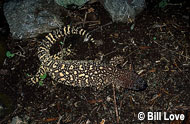Description:
The beaded lizard is one of two dangerously venomous lizard species in the world, so extreme caution must apply whenever dealing with them in captivity. The beaded lizard is an animal to admire from a safe distance, not one to handle casually. Long-term captive beaded lizards often become sluggish and seemingly tame, but they may never be fully trusted to not administer a lightning fast, bulldog-like bite. Beaded lizards are active most often when temperatures are in the 80’s Fahrenheit regardless of the time of day. They explore their domains with constant tongue flicks to find hidden prey items. These can range from nests of rodents to other lizards and snakes to bird eggs and nestlings in trees. A solidly built, locking cage is an absolute necessity for housing beaded lizards and gravel makes a good substrate material. A heavy ceramic bowl set where it can’t be easily tipped is needed to counter beaded lizards destructive digging tendencies. A hot basking lamp illuminating one end of the enclosure should be balanced by a sturdily constructed wooden shelter at the opposite end.
Habitat:
Mesic forested hillsides with pronounced wet and dry seasons.
Range:
Western coast of Mexico from southern Sonora south to an isolated population in central Guatemala.
Scientific Name: Heloderma horridum
Species Group:
Family: Helodermatidae
Size: The various races reach maturity between 24 and 30 inches, but occasionally reach a heavy-bodied 4 feet.
Level: advanced
Weight:
Dangerous: No


